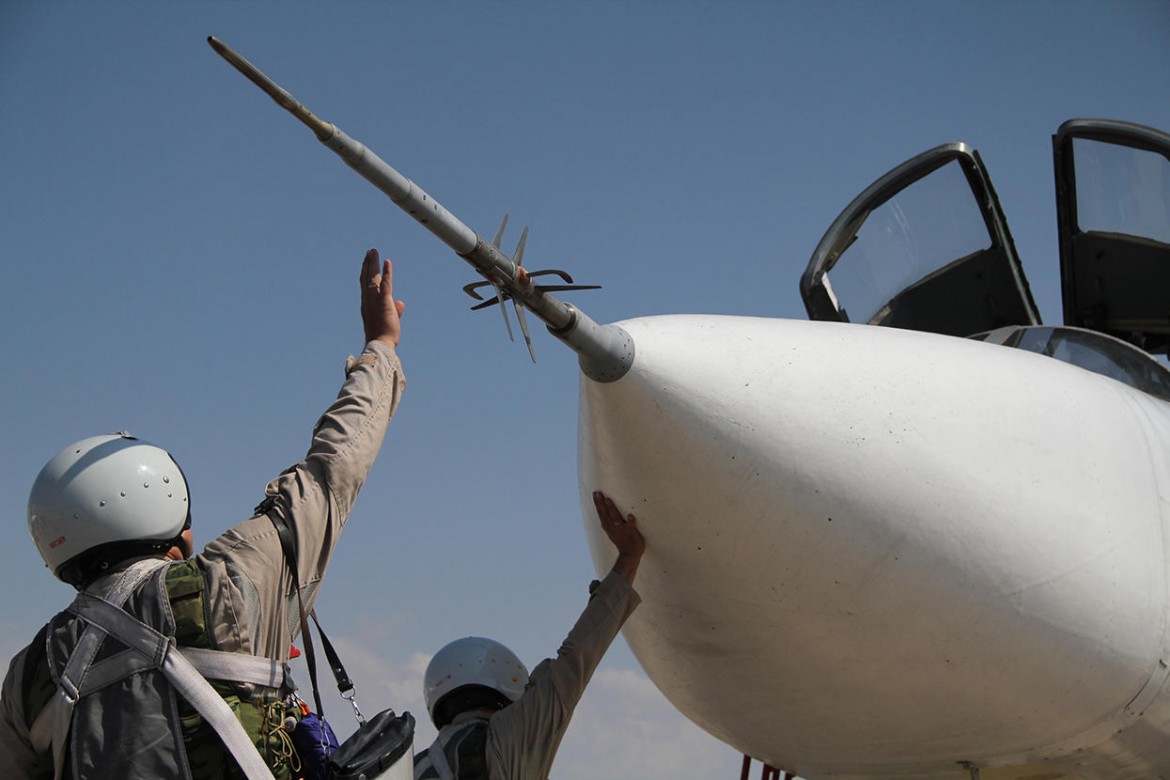Analysis
Trump threatens ‘smart’ missiles while OPCW pleads for time
The Trump administration has made its intentions clear: “Get ready Russia, because [missiles] will be coming.” Meanwhile, military motions on the ground all point toward the kind of Middle East buildup that’s become a recurring episode over the last two decades.

Preparations for the Syrian conflict continue. The United States and Russia are on a war footing and the only group keeping the peace is the Organization for the Prohibition of Chemical Weapons (OPCW).
After receiving an invitation from Damascus, the OPCW said Wednesday its director, Ahmet Uzumcu, will soon send 10 experts to Ghouta to verify whether the government used chemical weapons in the suburb, recently recaptured by the Syrian army. But it will take at least a month, he added, to have sure lab results from the samples they collect.
Syria may not have that much time. Escalation is a reality, a recurring episode of almost identical events in the Middle East over the last two decades. Tuesday the UN Security Council staged the expected clash of vetos between Russia and the US, which have sunk each other’s resolutions. Both demanded independent investigations; Moscow wanted to call on international monitoring organizations while Washington wanted to change the way investigators were selected.
Wednesday the clash continued: “Get ready Russia, because they will be coming, nice and new and ‘smart!’” referring to the missiles he intends to use for an unspecified intervention in Syria. “You shouldn’t be partners with a Gas Killing Animal who kills his people and enjoys it!” (He later seemed to backtrack in a tweet Thursday: “Never said when an attack on Syria would take place. Could be very soon or not so soon at all!”)
“Intelligent missiles should fly toward terrorists and not on the legitimate government that has spent years fighting international terrorism on its territory,” said Maria Zakharova, spokeswoman for the Russian Foreign Ministry. She then provocatively asked: “Is the real goal to eliminate the traces of a provocation using intelligent missiles so that the international inspectors cannot find the evidence they are looking for?”
And if Russian President Vladimir Putin uses conciliatory words (Wednesday, criticizing Trump’s Twitter-diplomacy, he said he hoped “common sense will prevail and that international relations return to a constructive track”), the Russian ambassador to Lebanon, Alexander Zasypkin, goes in the opposite direction. In an interview with al-Manar TV, linked to Hezbollah, he said that “in the case of a US missile attack, in line with the indications of Putin and the chief of staff, we will destroy the rockets and structures that launched them.”
On the ground concrete military maneuvers continue. In addition to the US destroyer Cook traveling toward the Syrian coast, aircraft are arriving via the US aircraft carrier Truman. British bases in Cyprus are on alert, though the Cypriot government said it was not involved in any anti-Assad military plan. Also on alert are the Russian bases in Syria, starting from that of Tartus, the city to which the Cook is heading. Throughout this month, the Russian navy will carry out drills along the Syrian coast.
NATO is also active with the US, on Wednesday carrying out aerial reconnaissance operations over Syria. From the Italian base at Sigonella, a NATO Boeing Poseidon took off for Latakia, close to the Syrian base of Hmeimim, where Russian soldiers are also stationed, while a second Boeing patrolled the northern border with Turkey.
Wednesday night, Trump received the Chairman of the Joint Chiefs of Staff Joseph Dunford and Secretary of Defense James Mattis at the White House. On the table were the various military options in a meeting that acted to legitimize the US threat to Syria.
Finally, Iran and Turkey, the regional actors of the conflict, are on the move. While Ali Akbar Velayati, commander in chief of Iranian forces in Syria, visited Ghouta, the Turkish foreign minister Cavusoglu overturned the Turkish position on Assad again.
After trying for years to drop it, he had turned to Moscow to petition for at least one win: control of the Kurdish-Syrian region Rojava. Now the winds of war are encouraging Ankara: Assad must be driven out, Turkish Foreign Minister Mevlut Cavusoglu said. He returned to sender (Tehran) the request to deliver the occupied Kurdish canton of Afrin to Damascus. “We want to normalize the situation in Afrin, and delivering the area to the regime will not allow us to achieve our goal.”
Originally published at https://ilmanifesto.it/trump-tira-fuori-i-missili-smart-opac-dateci-un-mese/ on 2018-04-12
